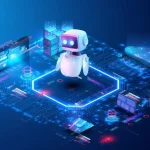In today’s fast-changing world, technology shapes almost every corner of our lives. Artificial Intelligence (AI) is no longer just a concept for tech enthusiasts—it’s a powerful force driving change in the way we live, work, and solve problems. From suggesting the next song on your playlist to helping doctors detect diseases faster, AI’s presence is everywhere. That’s why understanding AI isn’t just helpful—it’s becoming a core skill for thriving in the future.
1. Preparing for the Future Job Market
The workforce is evolving at lightning speed. AI-powered tools are transforming industries from retail and manufacturing to healthcare and finance. While automation may replace certain repetitive tasks, it also opens doors to entirely new career paths that blend technical skills with creativity, empathy, and strategic thinking.
Learning about AI helps people adapt to these changes rather than fear them. Those who understand how AI works can use it to improve their productivity, creativity, and problem-solving abilities. By developing these skills now, students and professionals alike will be better positioned to succeed in a job market that values adaptability and innovation.
2. Strengthening Problem-Solving and Analytical Thinking
AI revolves around identifying patterns, analyzing data, and creating systems that can make predictions or decisions. By engaging with AI concepts—whether through coding, exploring machine learning models, or evaluating algorithmic outcomes—learners sharpen their ability to think critically.
This kind of hands-on exploration encourages questioning assumptions, analyzing evidence, and considering the ethical consequences of technological decisions. These skills are essential not just for working in AI, but for making informed decisions in any career.
3. Sparking Innovation and Entrepreneurship
Some of the most groundbreaking ideas emerge when technical knowledge meets creativity. By introducing AI concepts early—like image recognition, natural language processing, or predictive analytics—students gain the tools to turn big ideas into real-world solutions.
With the right know-how, even small teams or solo entrepreneurs can create AI-driven innovations in areas like sustainable energy, healthcare, or global supply chains. The combination of technical literacy and entrepreneurial spirit can lead to transformative results.
4. Promoting Digital Literacy and Ethical Awareness
AI systems increasingly shape the content we see online, influence hiring decisions, and guide how resources are distributed. Without an understanding of how these systems operate, people risk becoming passive consumers of technology rather than active participants.
AI education helps build digital literacy and ethical awareness, teaching learners about fairness, privacy, and transparency. This knowledge enables individuals to engage critically with AI-driven systems and demand accountability from the technologies that impact their lives.
5. Tackling Global Challenges
The world’s biggest challenges—climate change, healthcare crises, food security—require large-scale, data-driven solutions. AI can help analyze massive datasets, forecast potential outcomes, and support breakthroughs in research and policy.
Those trained in AI can use these tools to address urgent problems, from optimizing renewable energy systems to advancing medical discoveries. In this way, AI education equips future leaders to create meaningful change on a global scale.
6. Embracing Lifelong Learning
AI is advancing rapidly, and education doesn’t stop after graduation. Professionals in all fields need to keep learning to stay relevant as new tools and methods emerge. Online programs, workshops, and ongoing training make it possible to remain competitive and informed.
A mindset of continuous learning ensures that individuals can adapt, innovate, and stay ahead in an ever-evolving landscape. Those who keep expanding their skills will always have the flexibility to seize new opportunities.
7. Empowering Educators and Institutions
For AI education to be effective, schools and universities must also embrace AI literacy. Educators who understand AI can design practical, engaging lessons that encourage curiosity and creativity.
When institutions integrate AI into their curricula, they prepare students not just for academic success but for the realities of the modern workforce. Supporting teachers with resources and training ensures that AI becomes a subject of exploration and empowerment, rather than intimidation.
Final Thoughts: Building a Smarter, More Responsible Future
AI is woven into the fabric of modern life, and its influence will only grow. By prioritizing AI education, we prepare people to lead with knowledge, responsibility, and imagination.
Ultimately, learning about AI is about more than understanding technology—it’s about shaping a generation of adaptable, thoughtful problem-solvers ready to navigate a world defined by innovation and change.





